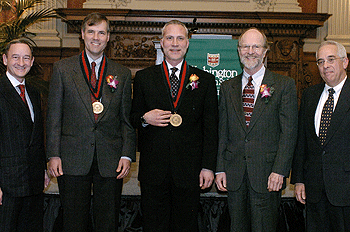The George E. Pake Professorship, established by the JSM Charitable Trust and John F. McDonnell to honor one of the University’s most influential leaders, was bestowed upon William E. Buhro, Ph.D., at a ceremony in Ridgley Hall’s Holmes Lounge.
McDonnell is vice chairman of the University’s Board of Trustees and retired chairman of the board of McDonnell Douglas Corp.
“I am very grateful to John McDonnell and the JSM Charitable Trust for establishing this professorship,” Chancellor Mark S. Wrighton said.

“Because of their generosity, we are able to recognize the past contributions of George Pake, whose pioneering research led to many important breakthroughs, as well as the present and future contributions of Bill Buhro and his colleagues, advancing future breakthroughs in materials science,” Wrighton added.
Noting that this is one of three professorships established by McDonnell and the JSM Charitable Trust to support materials innovation, Wrighton acknowledged their tremendous support for professorships.
“The McDonnell name is associated with more than a dozen professorships at Washington University,” he said. “This represents an extraordinary impact on the quality of our teaching and research.”
Buhro, professor of chemistry in Arts & Sciences and associate director of the Center for Materials Innovation, is a distinguished researcher and teacher in the field of nanoscience and materials chemistry.
Buhro’s interests range from synthetic inorganic and materials chemistry to metallic nanoparticles, nanowire and nanotube growth mechanisms and nanocrystalline/nanocomposite structural materials.
Recently, he has been involved with semiconductor quantum wires and the influence of geometric dimensionality on quantum confinement, as well as electrical transport in boron-based nanowires.
He collaborates extensively with faculty colleagues in both the School of Engineering & Applied Science and the Department of Physics in Arts & Sciences.
He has published more than 90 papers in refereed journals. The National Science Foundation (NSF), Monsanto Chemical Co., Eastman Kodak Co., Emerson Electric Co. and the Air Force Office of Scientific Research, to name a few, have supported his work.
In 1991, he received the NSF’s Presidential Young Investigator Award. In addition to receiving two teaching awards presented by Arts & Sciences students, Emerson Electric Co. gave him its Excellence in Teaching Award in 1996.
Buhro has served his department and the University as both a member and chair of faculty search committees, the Graduate Admissions Committee and the Library Committee.
He has served on the University’s Faculty Senate and currently chairs the Danforth Campus Committee on Research Integrity.
He is active in his profession, serving as associate editor of Chemistry of Materials, serving on editorial boards for several periodicals, reviewing journals and performing reviews for funding agencies.
He has held many leadership positions in various professional organizations, including the American Chemical Society.
Buhro earned a bachelor’s degree from Hope College and a doctoral degree from the University of California, Los Angeles. He held the Chester Davis Research Fellowship at Indiana University for two years before joining Washington University in 1987.
The entire University community, from the Danforth Campus to the Medical School Campus, has been enhanced by the generosity of the McDonnell family and their associated foundations.
In addition to their extraordinary support for professorships, they have given substantially in support of a host of scholarships, academic initiatives and buildings at the University. These gifts have helped strengthen the University and have encouraged many others to follow their example.
“I’m very grateful to John McDonnell and the JSM Charitable Trust for providing this significant support of materials science at a time of great promise for its contributions to society,” said Edward S. Macias, Ph.D., executive vice chancellor, dean of Arts & Sciences, and the Barbara and David Thomas Distinguished Professor in Arts & Sciences.
Long active in the University’s leadership, McDonnell is immediate past chairman and current vice chairman of the Board of Trustees.
For Arts & Sciences, McDonnell was a founding chair of its National Council; he now serves on the School of Engineering & Applied Science’s National Council.
He and his wife, Anne, are life members of the William Greenleaf Eliot Society and sustaining charter members of the society’s Danforth Circle.
Among his most significant gifts is a $10 million endowment, established in 2005 with the JSM Charitable Trust, to create the McDonnell International Scholars Academy.
In addition, he served as chairman of the leadership phase for the Campaign for Washington University.
George E. Pake, for whom the professorship is named, joined the faculty at Washington University after graduating from Harvard University.
During his first year as an assistant professor in the 1940s, he wrote an article on a new technique called nuclear magnetic resonance. This paper became an instant classic and served as a predictor of Pake’s forthcoming success.
Except for a six-year appointment as professor of physics at Stanford University, Pake’s entire academic career was spent at Washington University, where he chaired the physics department from 1952-1960 and served as provost from 1962-1970.
“George Pake influenced and guided Washington University’s development into an internationally renowned institution,” Wrighton said. “He worked tirelessly to recruit and retain excellent faculty to the University in areas as diverse as computer science, engineering and biology.”
In addition, Pake was in great demand for governmental committees. In 1970, he left the University to create the Palo Alto Research Center (PARC) at the Xerox Corp., now a world-famous institution responsible for developments such as the first personal computer, the laser printer, the electronic mail system (e-mail) and area network technology (i.e., Ethernet).
Pake left PARC in 1978 to oversee Xerox Corporate Research; in 1986 he became director of the Institute for Research on Learning, and in 1991, he was named director emeritus.
Among his prestigious awards and citations are the National Medal of Science awarded from President Reagan in 1987 and an honorary doctor of science degree from Washington University in 1995. Pake died in 2004.